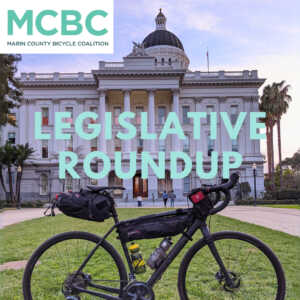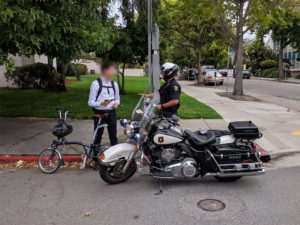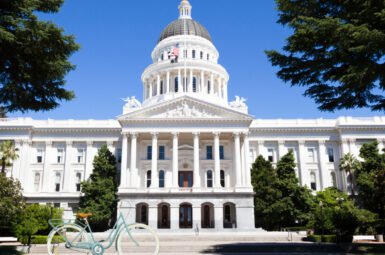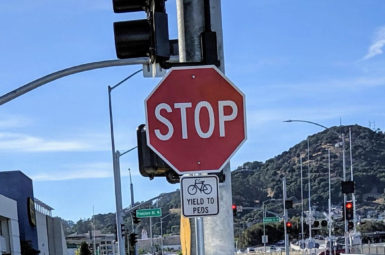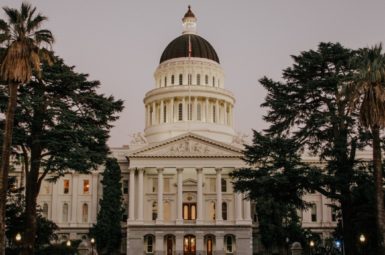Updates on State Bills Legislative Roundup Fall 2023
Another legislative session has come and gone. Read our Legislative Roundup 2023. We’re here to give updates on the state’s new laws, and the bills that we were rooting for that didn’t make it.
Bicycle Safety Stop – SB 73 (Boener)
The bicycle safety stop (or “stop as yield”) returned for another year. Substantial evidence shows that allowing bicyclists to treat stop signs as “yields” is safe. Nine states have legalized the practice (Colorado being the most recent) and the National Highway Traffic Safety Administration (NHTSA) recently published a fact sheet endorsing a “stop as yield” policy. That said, Governor Newsom vetoed a version of the bill in 2021, and threatened to in 2022, leading to the bill’s being pulled in that cycle.
Status: For reasons we don’t fully understand, the bill’s author pulled the bill before it was voted on.
What’s next: The California Bicycle Coalition said that they would be seeking a new author to lead on the bill next cycle.
The Impact of Heavy Cars – AB 251 (Ward & Friedman)
Automobiles have been getting heavier and heavier in the last several decades. A 1990 Honda Civic weighed just over 2,000 lbs. The battery alone for the 2023 electric F-150 Lighting weighs 2,000 lbs., and the whole vehicle is two and a half tons. This has significant impacts on our transportation, both for wear and tear on our streets and increased danger to people walking or bicycling. In a recent study, the Insurance Institute for Highway Safety found that SUVs are 55% more dangerous for bicyclists than lighter cars with lower hoods. This bill would require the California Transportation Commission to study and report back on the costs of heavy vehicles on our transportation system, looking at scaling registration fees based on weight.
Status: Signed by the governor
What’s next: The California Transportation Commission must convene a task force to research the relationship between vehicle weight, injuries, and road wear. The report must be completed by the end of 2025.
Automated Ticketing of Bike Lane Blockers – AB 361 (Ward)
Painted bike lanes are often used as standing zones for delivery drivers, people picking up passengers, or ride-hailing vehicles. This bill would authorize public agencies to install forward-facing cameras on publicly-owned parking enforcement vehicles to ticket drivers who block the bicycle lane.
Status: Signed by the governor
What’s next: Public agencies may now install cameras on parking enforcement vehicles to fine bike lane blockers. We do not know if any Marin jurisdictions plan to do this, but we will follow up if they do.
Increasing Visibility of Crosswalks AB 413 (Lee)
A large threat to pedestrians is visibility at crosswalks. Many states prohibit cars from parking closer than 15’ or 20’ from a crosswalk. California, however, allows drivers to park right up to the crosswalk line, reducing visibility for pedestrians and drivers. This issue is particularly acute for people using wheelchairs, pushing baby strollers, or jogging. This bill would require drivers to park at least 20 feet from crosswalks, increasing visibility and safety for all.
Status: Signed by the governor
What’s next: Parking within 20 feet of a crosswalk is now prohibited whether or not the curb is painted red. However, without a red curb or sign explicitly prohibiting parking within 20’ of a crosswalk, cities may only issue warnings until Jan 1, 2025. Cities can pass local ordinances modifying the 20’ requirement, and we’ll be watching to make sure no one waters it down here in Marin. One fun fact is that bicycle parking explicitly may be installed in the newly open 20’ of curb space, freeing up room for a great deal of much-needed bike parking.
Automated Speed Cameras – AB 645 (Friedman)
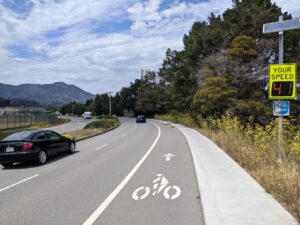
Automated speed enforcement is a technology used to great effect in many cities and countries. New York City has seen significant reductions in speeding and injury crashes in the zones where speed cameras have been installed. This bill authorizes a six-city pilot program of speed cameras (SF, LA, Oakland, San Jose, Glendale, and Long Beach) to explore the technology. Advocates see the bill as a way to reduce speeding while decreasing motorist interactions with armed law enforcement. Fines would scale with speed, and low-income drivers would pay a reduced rate.
Status: Signed by the governor
What’s next: The pilot cities will begin implementing a speed safety pilot. Before a pilot begins, a city has to submit a full report documenting the planned locations and cost of the system. Within five years of the system’s beginning operation, another report must be submitted to the state demonstrating costs and impact on crash rates. No Marin jurisdictions were included in the initial pilot, but we will be paying close attention to the outcomes of the various city pilots.
Decriminalizing Sidewalk Riding – AB 825 (Bryant)
Whether riding on the sidewalk is permitted or prohibited varies from city to city, with different rules between neighboring municipalities (here are the rules in Marin, which vary widely). While sidewalk riding is certainly not recommended in all circumstances, many riders feel it is their best option if traveling along a busy road with no bike lanes. AB 825 would have allowed bicyclists to ride on the sidewalk under the following conditions: (1) there are no adjacent bike lanes, (2) they yield to pedestrians, and (3) they travel with due care. The final version of the bill did not apply to e-bikes.
Status: Passed by the legislature but vetoed by the governor
What’s next: The author may bring the bill back in a different form, but the future is uncertain.
Unbundling Parking from Rent – AB 1317 (Carrillo)
While most apartments built after the 1950s have dedicated parking spaces, not everyone owns a car. In fact, 5% of Marin’s households have no car available, and another 10% of households have fewer cars than employed people. However, people who rent apartments typically have to pay for their off-street parking spot, whether or not they use it. This bill compels landlords to “un-bundle” the parking, i.e. allow tenants to pay for a parking spot separately from their rent. This would reduce the rent for car-free or car-light households, and free up additional spots for larger households with more cars than they have parking spots.
Status: Signed by the governor
What’s next: The bill was amended only to apply to (1) new buildings (2) with 16 or more units (3) located in one of 10 California counties that does not include Marin.
Richmond-San Rafael Bridge – AB 1464 (Connolly)
This bill confused us a bit. Assemblymember Damon Connolly has long made it clear that he would like to see a third westbound lane for cars on the Richmond-San Rafael Bridge. This bill would have urged Caltrans to consider doing so, but because the legislature is not permitted to write projects into existence (for good reason!), it was limited to merely a suggestion. Ultimately it failed to pass out of committee and did not advance to a full vote.
We at MCBC have gone into some depth on the Richmond-San Rafael Bridge in a recent piece linked here. While there aren’t any easy (or cheap) answers to the congestion drivers traveling to Marin currently experience, another lane won’t help in the long run and it certainly will not improve the air quality in Richmond, as some have claimed.
Status: Died in committee
What’s next: We’ll be continuing our conversation with the Assemblymember in case he wants to author another bill dealing with the bridge.
Ending Pretextual Stops – SB 50 (Bradford)
Much of discriminatory policing is done through a practice known as a “pretextual stop.” Motorists or bicyclists are stopped for minor violations of the vehicle code, which is in reality a pretext to permit the officer to search or otherwise detain the person. This bill would prohibit law enforcement from stopping bicyclists simply because their bicycle is not fitted properly with a lamp and reflectors or because a rider thought to be under 18 is not wearing a helmet. Other moving violations prohibited by the vehicle code would still permit a stop by law enforcement.
Status: Failed to pass out of the Assembly
What’s next: The author may bring the bill back in a different form, but the future is uncertain.
Ending Bike Bans in Apartments – SB 712 (Portantino)
Apartment landlords occasionally prohibit tenants from bringing bicycles, e-bikes, or scooters into their apartments. This can prevent people from commuting or traveling via low-cost, low-emissions vehicles if they are forced to store them outside where they may be subject to theft. This bill would prohibit landlords from banning personal mobility devices from being stored in apartments unless they offer secure, long-term storage elsewhere in the building.
Status: Signed by the governor
What’s next: Tenants can now store up to one personal micromobility device (a scooter or bike, either human or battery-powered) per person, provided that electric devices meet electrical standards.
sign-up for advocacy alerts
We will need your help ensuring these bills get passed! Please sign-up for advocacy alerts using the form below and we’ll tell you when/how to support our efforts.
members make it happen
We’re working to make Marin more bike-friendly for people of all ages and abilities. Are you with us?
